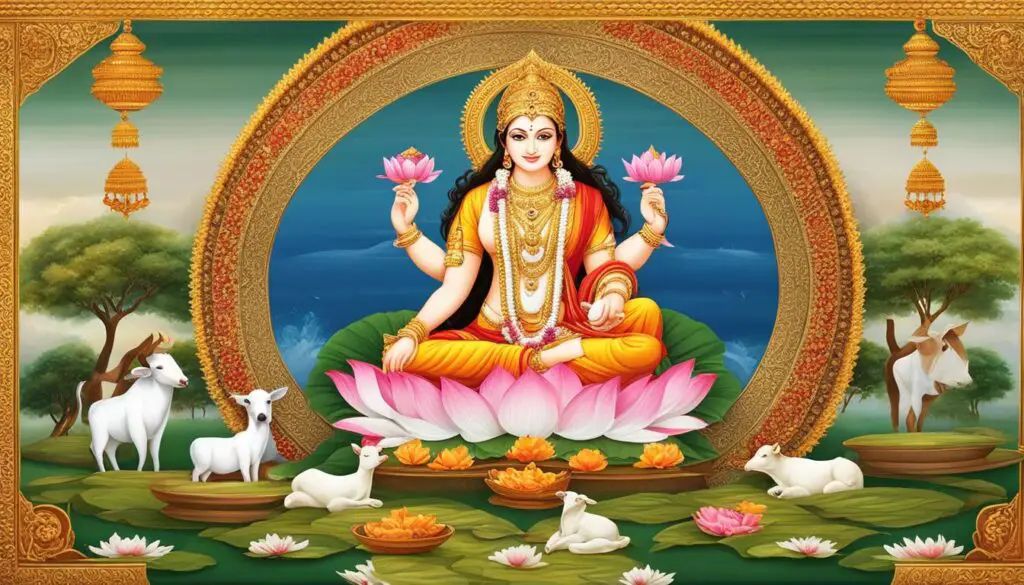Vedic literature, an integral part of ancient Indian literature, is a treasure trove of spiritual and mythological themes. With its profound connection to spirituality and mythology, it reflects the rich cultural and philosophical heritage of India. Spanning thousands of years, Indian literature encompasses various genres such as poetry, drama, fiction, and non-fiction, each influenced by the cultural, religious, and philosophical beliefs of the country.
Key Takeaways:
- Indian literature showcases the diverse cultural and philosophical heritage of India.
- Vedic literature provides insights into spirituality, mythology, and the eternal quest for self-realization.
- The Vedas are the foundational texts of Hinduism and reflect the religious and philosophical beliefs of ancient India.
- Indian literature explores themes of karma, dharma, and liberation, serving as vehicles for moral and ethical teachings.
- It includes not only epics like the Mahabharata and the Ramayana but also folk tales, regional legends, and oral traditions.
The Importance of Wealth in Vedic Literature
Wealth holds great significance in Vedic literature and is regarded as a crucial aspect of human life. It is seen as a means to attain prosperity, material potential, and social status in the physical world. Within the Vedic tradition, the importance of material wealth is acknowledged for the overall happiness and well-being of individuals and society as a whole. However, the pursuit of wealth is always emphasized to be within the boundaries of righteousness, known as dharma.
Wealth, in the context of Vedic literature, goes beyond mere material assets. It encompasses intangibles such as knowledge, friendship, and love, which are also considered forms of wealth. The Vedic seers offer prayers for the attainment of wealth, recognizing it as a source of happiness and enjoyment. Wealth is seen as a friend that can enhance one’s life experiences and contribute to personal and societal development.
The significance of wealth is not limited to Vedic literature alone but is also highlighted in Hindu Dharma. It is understood that wealth enables individuals to fulfill their responsibilities, duties, and obligations, allowing them to actively contribute to the welfare and progress of society. However, it is crucial to note that wealth is not considered the ultimate goal in Vedic literature. Instead, it is regarded as a means to achieve a higher purpose in life, which transcends the material realm.

Throughout Vedic literature, the importance of wealth is emphasized as a tool for personal growth and social well-being. It encourages individuals to utilize wealth responsibly and ethically, while also advocating for acts of generosity and charity. The concept of wealth in Vedic literature aligns with the idea that one should strive for prosperity and success but should never lose sight of their moral and ethical values.
In summary, wealth holds immense importance in Vedic literature, not only as a means of achieving prosperity but also as a tool for personal and spiritual growth. It is viewed as a friend that can contribute to the overall well-being of individuals and society, while also reminding them of the importance of leading a righteous and virtuous life.
The Various Aspects of Wealth in Vedic Literature
Vedic literature delves into the multifaceted aspects of wealth and its profound significance in the realm of human existence. It explores different forms of wealth, encompassing both material possessions and intangible treasures. This comprehensive understanding of wealth reflects the holistic nature of Vedic teachings.
In Vedic literature, wealth extends beyond the accumulation of riches and includes invaluable elements such as progeny, sustenance, and overall well-being. The seers, through their prayers, aspire for the acquisition of wealth that encompasses both physical prosperity and spiritual abundance. They recognize wealth as a means to fulfill human desires, attain contentment, and cultivate lasting happiness.
The Vedas and other sacred texts provide valuable guidance on how to acquire and utilize wealth in a righteous and ethical manner. These teachings emphasize the importance of generosity, charity, and responsible stewardship of wealth. “The one who gives, receives in return; the one who hoards, loses everything.” This profound statement reflects the essence of Vedic wisdom, emphasizing the value of sharing and the positive karmic effects of selfless acts.
Moreover, Vedic literature stresses the harmonious alignment of wealth with dharma – the righteous path. Wealth is considered a divine gift that should be utilized for the greater good of society, nurturing compassion and uplifting the underprivileged. It cautions against the pitfalls of greed, attachment, and the misuse of wealth for self-serving purposes.
The rich tapestry of Vedic literature encompasses various categories, including the Vedas, Brahmanas, Aranyakas, Upanishads, and Sutras. Each category offers unique insights into the dimensions of wealth and its implications for both personal and societal well-being. These sacred texts serve as timeless sources of wisdom, guiding individuals towards a balanced and purposeful approach to wealth.

Aspects of Wealth in Vedic Literature
| Forms of Wealth | Description |
|---|---|
| Material Possessions | Physical assets such as land, property, and possessions |
| Progeny | Healthy and virtuous offspring who carry on the family lineage |
| Sustenance | The ability to provide for one’s basic needs and lead a comfortable life |
| Well-being | Physical and mental health, harmony, and overall flourishing |
| Spiritual Prosperity | Inward growth, spiritual knowledge, and enlightenment |
| Generosity | The act of giving selflessly, promoting wealth’s innate potential to benefit others |
| Dharma-aligned Wealth | Wealth acquired and utilized in accordance with righteous principles |
As this table showcases, wealth in Vedic literature encompasses a broad spectrum, going beyond mere material possessions. The holistic understanding of wealth invites individuals to cultivate prosperity in all aspects of life, nurturing a harmonious existence marked by righteous actions and genuine care for others.
Conclusion
In conclusion, Vedic literature holds immense significance in Indian culture and literature. It encompasses a vast body of work that reflects the diverse cultural, religious, and philosophical heritage of India. Vedic literature explores spiritual and mythological themes, offering profound insights into the nature of life, consciousness, and the purpose of existence.
The importance of wealth in Vedic literature is evident, as it is considered a means to achieve prosperity, happiness, and overall well-being. However, Vedic literature also emphasizes that wealth should be pursued within the bounds of righteousness and used for the greater good. It serves as a timeless source of wisdom and guidance, inspiring individuals to lead virtuous lives and contribute to the welfare of society.
The significance of Vedic literature extends far beyond its cultural and historical context. Its universal appeal continues to inspire and influence writers and readers worldwide, making it an integral part of the world’s literary heritage. The profound insights and philosophical teachings found in Vedic literature provide valuable lessons that remain relevant in the modern world, serving as a compass for navigating life’s challenges and seeking spiritual enlightenment.
FAQ
What is Vedic literature?
Vedic literature refers to a collection of ancient scriptures and contemporary works that showcase a deep connection to spirituality and mythology in India.
What does Indian literature encompass?
Indian literature encompasses a vast body of work that includes poetry, drama, fiction, and non-fiction, reflecting the rich cultural and philosophical heritage of India.
How far back does the Indian literary tradition date?
The Indian literary tradition dates back to the Indus Valley Civilization, and the earliest extant Indian literature is in the form of the Vedas.
What are the Vedas?
The Vedas are the foundational texts of Hinduism and reflect the religious and philosophical beliefs of ancient India.
What themes are explored in Indian literature?
Indian literature explores spiritual and philosophical themes such as karma, dharma, and liberation, offering insights into the eternal quest for self-realization and enlightenment.
Is Indian literature limited to epics like the Mahabharata and the Ramayana?
No, Indian literature also includes folk tales, regional legends, and oral traditions that reflect the cultural and social diversity of India.
What role does wealth play in Vedic literature?
Wealth is considered an important aspect of human life in Vedic literature and is recognized as a means of achieving worldly prosperity, material potential, and social status.
What forms of wealth are discussed in Vedic literature?
Vedic literature discusses different forms of wealth, including material possessions, progeny, sustenance, and well-being.
How should wealth be pursued according to Vedic literature?
Wealth should be pursued within the bounds of righteousness (dharma) and used for the greater good of society.
What guidance does Vedic literature provide on acquiring and utilizing wealth?
Vedic literature emphasizes the importance of generosity, charity, and responsible stewardship of wealth, cautioning against greed, attachment, and the misuse of wealth for selfish purposes.
What is the significance of Vedic literature in Indian culture?
Vedic literature holds immense significance in Indian culture and literature, reflecting the diverse cultural, religious, and philosophical heritage of India.

